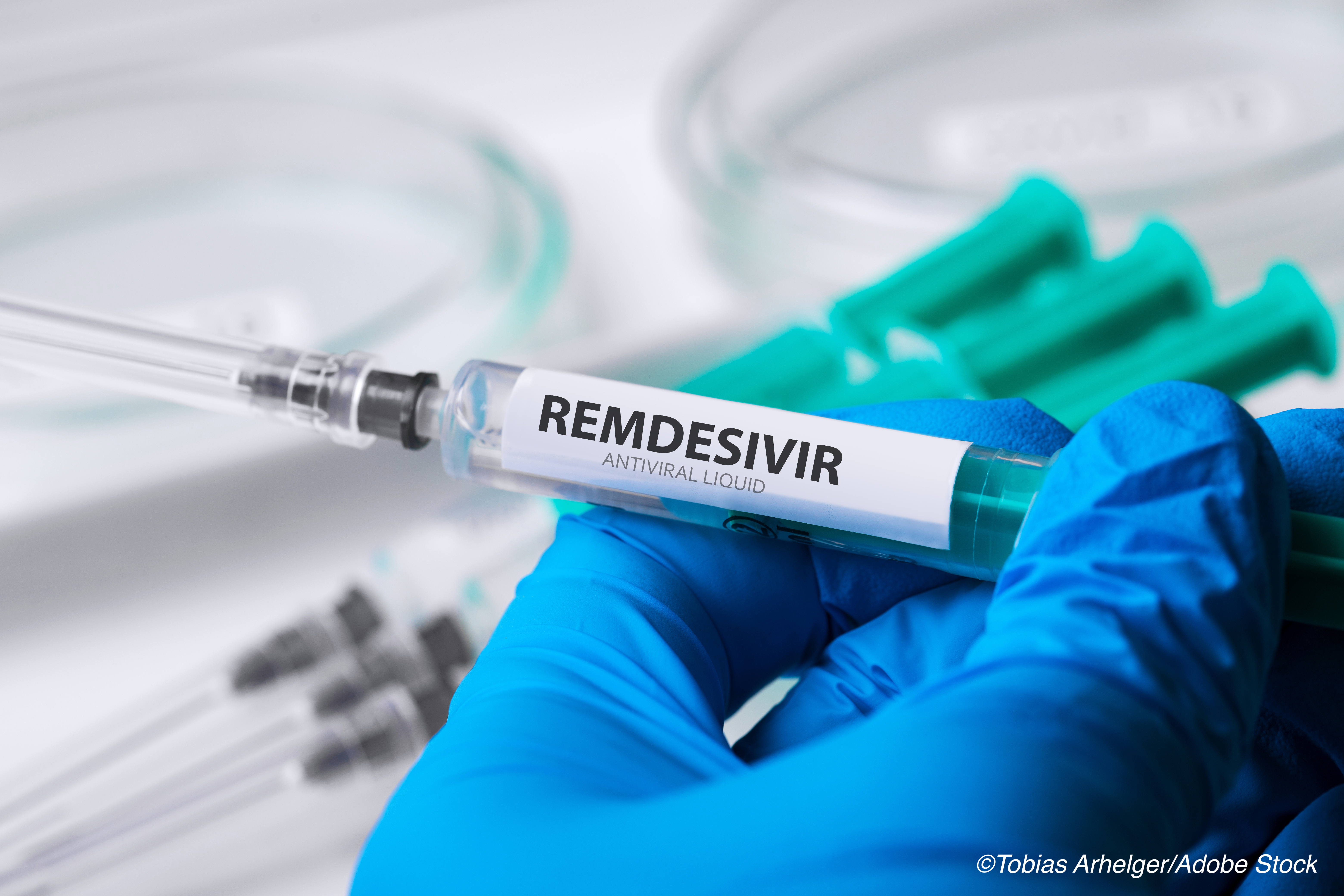Peer-reviewed findings from a retrospective study confirm the benefits of remdesivir as a treatment for patients hospitalized with Covid-19.
In the trial, which involved mostly minority patients living in Baltimore and Washington DC, patients treated with the antiviral drug recovered more quickly than patients who did not receive the drug, with a median time to clinical improvement of 5 days compared to 7 days.
Remdesivir-treated patients also had a lower 28-day mortality rate (7.7% versus 14% among matched controls), though the difference did not prove to be statistically significant in time-to-death analysis.
Writing in the journal JAMA Network Open, lead researcher Brian T. Garibaldi, MD, of Johns Hopkins University School of Medicine, Baltimore, and colleagues noted that the findings were similar to those shown in the National Institutes of Health-sponsored Adaptive Covid-19 Treatment Trial (ACTT-1).
Based largely on the ACTT-1 findings, remdesivir became the first drug approved for the treatment of severe Covid-19 by the FDA in late October of last year.
But Garibaldi and colleagues noted that other remdesivir studies, including the World Health Organization’s larger Solidarity trial, failed to show clinical benefit in hospitalized patients. Based on the Solidarity study findings, the WHO recommended against the use of remdesivir in this patient population.
Final results from the study by Garibaldi and colleagues were published online March 24, with preliminary findings made public ahead of peer review last November.
“These results provide further evidence that remdesivir may be effective in reducing the duration of Covid-19 illness, that a 5-day treatment course may be sufficient, and that (hospitalized) patients with milder disease likely benefit most,” the researchers wrote.
The study was conducted from March 4 through Aug. 29 of last year at the five-hospital health group Johns Hopkins Medicine System, which has 2,513 beds and serves approximately 7 million people.
Among 2,483 patients with confirmed severe acute respiratory syndrome coronavirus 2 infection, those treated with remdesivir were matched to infected patients who were not treated with the drug using time-invariant covariates (age, sex, race/ethnicity, Charlson Comorbidity Index, body mass index and do-not-resuscitate/intubate orders) and time-dependent covariates (ratio of peripheral blood oxygen saturation to fraction of inspired oxygen, blood pressure, pulse, temperature, respiratory rate, C-reactive protein level, complete white blood cell count, lymphocyte count, albumin level, alanine aminotransferase level, glomerular filtration rate, dimerized plasmin fragment D [D-dimer] level, and oxygen device).
Exposures included remdesivir treatment with or without corticosteroids, and the primary outcome was rate of clinical improvement (hospital discharge or decrease of 2 points on the WHO severity score). Secondary outcomes included mortality at 28 days, as well as clinical improvement and time to death associated with combined remdesivir and corticosteroid treatment.
Of 2,483 consecutive admissions, 342 patients received remdesivir, and 184 of these patients were also treated with corticosteroids. The median age of remdesivir-treated patients was 60 years (interquartile range, 46-69 years), 189 (55.3%) were men, and 276 (80.7%) self-identified as non-White race/ethnicity.
Among the main findings:
- Remdesivir-treated patients had a shorter time to clinical improvement than matched controls without remdesivir treatment (median, 5.0 days [interquartile range, 4.0-8.0 days] versus 7.0 days [interquartile range, 4.0-10.0 days]; adjusted hazard ratio, 1.47 [95% CI, 1.22-1.79]).
- Remdesivir-treated patients had a 28-day mortality rate of 7.7% (22 deaths) compared with 14.0% (40 deaths) among matched controls, but this difference was not statistically significant in the time-to-death analysis (adjusted HR, 0.70; 95% CI, 0.38-1.28).
- Adding corticosteroids to remdesivir was not associated with a reduced risk of death at 28 days (adjusted HR, 1.94; 95% CI, 0.67-5.57).
“Approximately 80% of patients in our cohort were non-White individuals compared with 30% to 47% in clinical trials,” Garibaldi and colleagues wrote. “Because underrepresented minority groups have shouldered a disproportionate burden during the Covid-19 pandemic but have not been widely represented in clinical trials, our results provide important evidence that receipt of remdesivir is associated with decreased time to clinical improvement in these populations.”
The researchers noted that the vast majority of patients treated with remdesivir received 5 days of the therapy “which supports recommendations for an initial 5-day course for most patients.”
They further wrote that while in the ACTT-1 study, patients on mechanical ventilation or other respiratory support beyond nasal cannula oxygen did not benefit, remdesivir-treatment did appear to be beneficial to this group in their trial although not as beneficial as in patients with more moderate disease.
They concluded that while the combination of remdesivir and corticosteroids was not associated with reduced mortality in their study, more research is needed of the combination treatment in the treatment of patients hospitalized with Covid-19.
- In a study of mostly minority patients, those treated with remdesivir recovered more quickly than patients who did not receive the drug, with a median time to clinical improvement of 5 days compared to 7 days.
- Remdesivir-treated patients also had a lower 28-day mortality rate (7.7% versus 14% among matched controls), but the difference did not prove to be statistically significant in time-to-death analysis.
Salynn Boyles, Contributing Writer, BreakingMED™
This research was funded by John Hopkins inHealth, the Johns Hopkins Precision Medicine Initiative and the U.S. Department of Health and Human Services.
Garabaldi reported receiving personal fees from Janssen Reeaarch and Development LLC and from the FDA Pulmonary-Asthma Drug Advisory Committee outside the submitted work.
Cat ID: 190
Topic ID: 79,190,730,933,190,926,192,927,151,928,925,934



